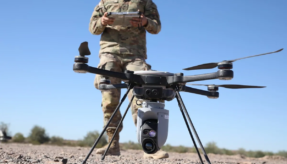
The UK Space Agency has launched a £50M fund to support the development of cutting-edge research and development facilities.
The Space Clusters and Infrastructure Fund (SCIF) – the first dedicated fund for UK space infrastructure – will award match funding to UK organisations to develop the R&D infrastructure needed to make space products mission-ready and sell them into commercial markets.
Investment in space R&D infrastructure is essential for building and testing new UK space and satellite capabilities, supporting innovative missions that can benefit people, businesses and communities across the country.
Minister of State at the Department for Science, Innovation and Technology George Freeman MP said: “The UK space industry – worth £17.5Bn to the UK economy and creating new companies and careers all around the country from Glasgow Space City to Spaceport Cornwall – is a key part of the UK Innovation Economy.
This £50M Space Clusters and Infrastructure Fund is the UK’s first fund dedicated to support the space industry develop the R&D facilities key to growing the space clusters across the UK, helping to generate investment, create jobs and enable UK space companies’ cutting-edge technology to be made mission-ready for new commercial satellite markets.
The funding is available to industry and academia who can deliver projects to procure, build or upgrade R&D facilities and equipment that will bring high potential, high value space technologies to market. SCIF is a pilot project that will support approximately five to ten projects of up to £10M each.
These projects will provide critical anchor points at the local level for new businesses, investment and research and aim to create hundreds of jobs in areas of the UK that need it most.
Dr Paul Bate, Chief Executive of the UK Space Agency, said: “The UK has a thriving space sector, which is well-established and globally respected. We are growing this exciting sector further, by catalysing investment, delivering missions and capabilities, and championing the power of space to improve lives.
“The Space Clusters and Infrastructure Fund demonstrates the government’s commitment to space and will help deliver the ambition set out in the National Space Strategy to build one of the most innovative and attractive space economies in the world, developing new skills and creating jobs.
“Levelling Up is a priority of the UK Space Agency and SCIF will allocate the majority of its budget outside of the Greater South-east, although proposals are welcome from anywhere in the UK.”
Lizzie Kerr, Director of UKspace, the industry trade association, said: “R&D underpins so much of the UK space industry’s activities and continued innovation. UKspace therefore welcomes this funding commitment from the Government which has the potential to impact many of our members, by developing and renewing facilities, and bringing growth and employment across the UK.”
Find out more and apply for the SCIF
If you would like to join our community and read more articles like this then please click here








